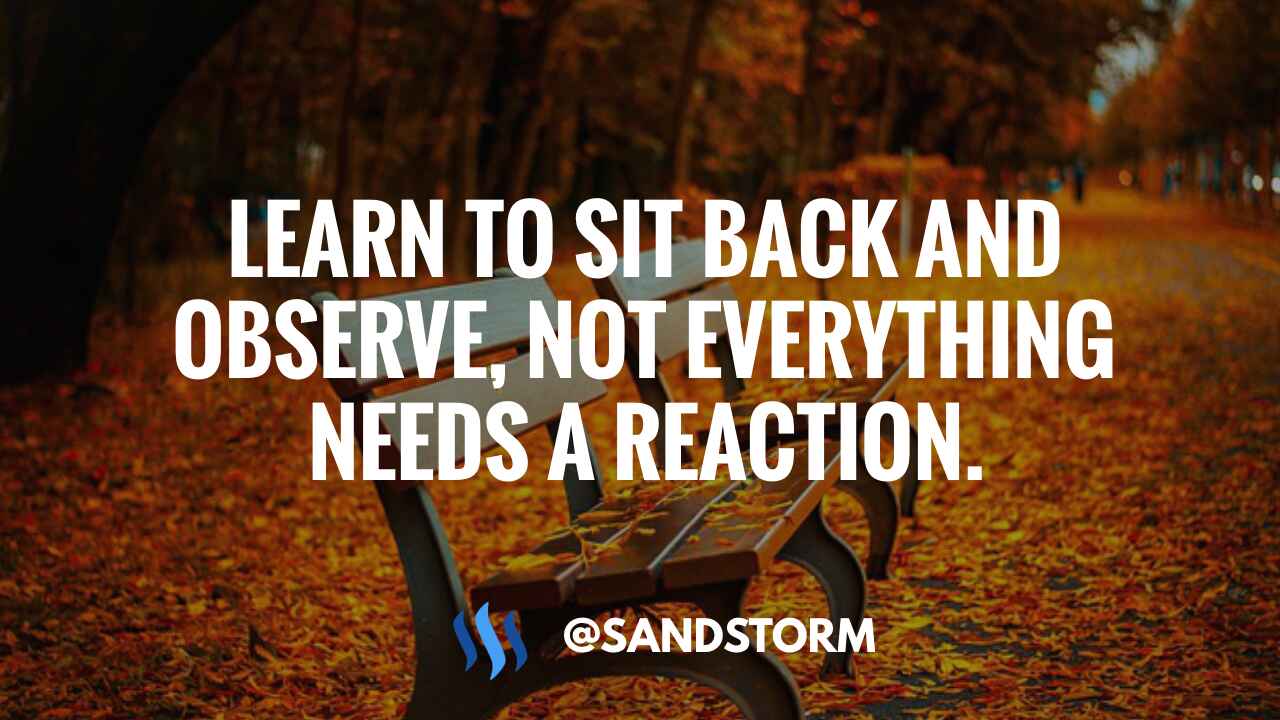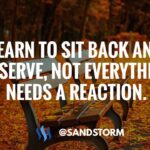In today’s fast-paced world, the ability to sit back and observe without immediate reaction has become increasingly valuable. The phrase “Learn to Sit Back and Observe. Not Everything Needs a Reaction” from Tymoff highlights the importance of mindfulness and thoughtful response in our daily interactions. This article delves into the benefits of observation, strategies to enhance this skill, and how it can lead to a more balanced and fulfilling life.
The Power of Observation
Observation is a fundamental skill that allows us to understand our surroundings and the people in them. It involves taking a step back to notice details, patterns, and behaviors that might otherwise go unnoticed. By observing, we gather valuable information that can inform our decisions and actions.
- Enhanced Understanding Observing without immediately reacting gives us time to process information more thoroughly, a powerful tool in mindful observation. This can lead to a deeper understanding of situations and people, enabling more empathetic and informed responses, a powerful tool for emotional intelligence.
- Reduced Stress: Constantly feeling the need to react to everything can be exhausting. By choosing to observe instead of reacting, we reduce our stress levels and conserve mental energy.
- Improved Relationships: When we take the time to observe and understand others, we can communicate more effectively and build stronger relationships. This approach fosters empathy and reduces misunderstandings.
Why Not Everything Needs a Reaction
Reacting to every situation can be counterproductive. Not all events require an immediate response, and sometimes the best course of action is to do nothing at all.
- Avoiding overreactions is essential; not everything needs action – tymoff, sometimes stillness and mindful observation lead to better outcomes.: Immediate reactions are often driven by emotions, which can lead to overreactions. Taking a moment to observe allows us to respond more rationally and avoid unnecessary conflicts.
- Prioritizing Responses Not all situations are equally important, and mindfulness practice helps us prioritize our decision-making. By observing first, we can prioritize our responses and focus our energy on what truly matters.
- Promoting Self-Reflection: Observing without reacting encourages self-reflection. It gives us the space to consider our values and intentions before taking action.
Strategies to Enhance Observation Skills
Improving our ability to sit back and observe requires practice and mindfulness. Here are some strategies to help develop this skill:
- Mindfulness Meditation: Practicing mindfulness meditation can help increase our awareness and focus. By regularly meditating, we train our minds to be present and attentive, which enhances our observational skills.
- Journaling: Keeping a journal of our observations can help us track patterns and reflect on our experiences. Writing down what we notice encourages deeper thinking and analysis.
- Active Listening: When interacting with others, practice active listening. This involves fully concentrating on what the other person is saying without planning your response while they are speaking, a key element of mindful observation.
- Limit Distractions: Reducing distractions in our environment can help us focus more on observing. This might involve setting aside specific times to disconnect from digital devices and be fully present in the moment.
- Regular Breaks: Taking regular breaks throughout the day to pause and observe can help us reset and stay mindful. These breaks provide an opportunity to step back and assess situations from a fresh perspective.
Real-Life Applications of Observation
Observation is a valuable skill in various aspects of life, from personal relationships to professional settings. Here are some practical applications:
- Conflict Resolution: In conflicts, taking the time to observe and understand all perspectives can lead to more effective resolutions. It allows us to approach disagreements with empathy and find common ground.
- Workplace Dynamics In professional environments, observing colleagues’ behaviors and interactions can help us navigate workplace dynamics more effectively, using the art of observation as a powerful tool. It can inform our approach to teamwork, leadership, and communication.
- Personal Growth By observing our own thoughts and behaviors, we can identify areas for personal growth, making informed decisions to enhance our personal and professional lives. Self-observation helps us recognize habits and patterns that may be holding us back and make conscious changes, a crucial aspect of mindfulness practice.
- Creative Endeavors: Artists, writers, and creators benefit from keen observation skills. Observing the world around them provides inspiration and depth to their work, a powerful tool in the art of observation.
Embracing Silence and Reducing Reactivity
One of the key aspects of sitting back and observing is embracing silence. In a world where constant communication is the norm, silence can be powerful. It allows us to process our thoughts and feelings without external input, leading to greater clarity and insight.
- The Value of Silence: Silence provides a space for introspection and contemplation. It helps us connect with our inner selves and gain a deeper understanding of our motivations and desires.
- Reducing Reactivity: By embracing silence, we reduce our tendency to react impulsively. This practice helps us respond more thoughtfully and intentionally, leading to better outcomes in our interactions by improving our decision-making and emotional intelligence.
- Cultivating Patience: Patience is a natural byproduct of embracing silence. It allows us to wait for the right moment to act and respond, rather than rushing into decisions.
Practical Tips for Embracing Silence
- Set Aside Quiet Time: Dedicate specific times each day to be in silence. This could be during a morning walk, meditation, or simply sitting quietly in a peaceful environment, allowing for stillness and mindful observation.
- Practice deep breathing, a mindfulness practice that enhances stillness and emotional regulation.: Deep breathing exercises can help calm the mind and create a sense of inner peace. This practice enhances our ability to sit in silence and observe.
- Limit Media Consumption: Reducing exposure to constant media and information can help us find moments of silence. Set boundaries for digital consumption to create space for quiet reflection and stillness.
- Engage in Solo Activities Activities like reading, gardening, or painting can provide opportunities for silent observation, enhancing our emotional intelligence and stillness. These activities allow us to be present and mindful without the need for conversation or interaction.



















